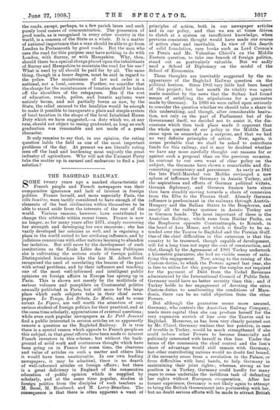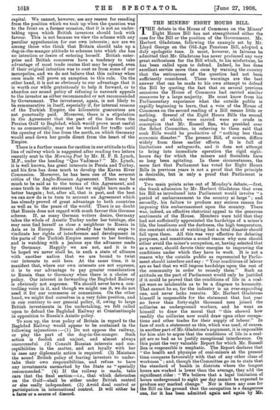THE BAGHDAD RAILWAY.
OME twenty years ago a marked characteristic of L. French people and French newspapers was their comparative ignorance and lack of interest in foreign politics. France herself, and more especially Paris, the vale lumiere, were tacitly considered to have enough of the elements of the best civilisation within themselves to be able to stand aside from the interests of the rest of the world. Various reasons, however, have contributed to change this attitude within recent times. France is now no longer, as for many years after 1871, simply recovering her strength and developing her own resources ; she has vastly developed her colonies as well, and is regaining a place in the world suited to her civilising influence, and by judicious connexions with other nations learning to abandon her isolation. But still more by the development of such institutions as the Ecole Libre des Sciences Politiques she is cultivating the serious study of foreign politics. Distinguished historians like the late M. Albert Sorel 'recognised the need of correlating the lessons of the past with actual problems, and by their influence and teaching one of the most well-informed and intelligent public opinions on foreign affairs in Europe has sprung up in Paris. This is shown not merely by the multitude of serious volumes and pamphlets on Continental politics annually published in Paris, but still more by the large place which such subjects take in their chief news. papers. Le Temps, Les Debuts, Is Matin, and to some extent Le Figaro, are well worth the attention of any serious student of foreign politics for their practical, and at the same time scholarly, appreciations of external questions ; while even such popular newspapers as Le Petit Journal find a public interested in serious articles on so apparently remote a question as the Baghdad Railway. It is true there is a special reason which appeals to French people on -this subject, in that great efforts have been made to interest French investors in this scheme ; but without the back- ground of solid work and continuous thought which have been going on in France for some time, the clearness and value of articles on such a matter and others like it would have been unattainable. In our own leading newspapers, it may be admitted, there is no dearth of well-informed articles on foreign affairs ; but there is a great deficiency in England of the consecutive education of public opinion which is supplied by scholarly, and at the same time popular, studies in foreign politics from the disciples of such teachers as M. Sorel, M. Rambaud, and M. Leroy-Beaulieu. The consequence is that there is often apparent a want of principles of action, both in our newspaper articles and in our policy, and that we are at times driven to clutch at a system on insufficient knowledge, when previous consistent thought would have made our course of action clear and inevitable. In view of this dearth of solid foundation, rare books such as Lord' Curzon's on Persia and Mr. Valentine Chirol's on the Middle Eastern question, to take one branch of foreign politics, stand out as particularly valuable. But we sadly need a School of Diplomacy on the model of the School of Economics.
These thoughts are inevitably suggested by the re- appearance of the Baghdad Railway question on the political horizon. Since 190$ very little had been heard of this project; but last month its vitality was again made manifest by the news that the Sultan had found means of satisfying the stipulations for a guarantee made by Germany. In 190$ we were called upon seriously to consider the question whether we should take a share in this undertaking, and though, after considerable hesita- tion, not only on the part of Parliament but of the Government itself, we decided not to assist it, the dis- cussions which then took place made it apparent that the whole question of our policy in the Middle East came upon us somewhat as a surprise, and that we had no very definite principles of action. Nor, again, it seems probable that we shall be asked to contribute funds for this railway, and it may be doubted whether we have any more carefully thought out reasons for' or against such a proposal than on the previous occasion. In contrast to our own want of clear policy on the subject, the Germans have shown a remarkable and dis- concerting consistency and persistence. As early as 1E41 the late Field-Marshal von Moltke envisaged a: new sphere of influence for Germ any in Asiatic Turkey, and the aspirations and efforts of German political writers, German diplomacy, and German finance have since then been steadily moving towards a chain of conneiion from the Elbe to the Persian Gulf. Already G,ermart influence is predominant in the railways thiough Austria- Hungary and the Balkan States to the Bosphorus, and nearly all the railway systems in Asiatic Turkey are in German hands. The most important of these is the Anatolian Railway, which runs from Haider Pasha, .on the Bosphorus opposite Constantinople, to Konieh, in the heart of Asia Minor, and which is finally to be ex- tended over the Taurus to Baghdad and the Persian Gulf. One of the chief difficulties in this extension is that the country to be traversed, though capable of development, will for a long time not repay the cost of construction, and that, though by the Agreement of 1903 Turkey undertoplc a kilometric guarantee, she had no visible means of satis- fying this engagement. . Now, owing to the raising' of the Custom-duties, to which the Powers agreed last year, she is free to utilise for this purpose the surplus not required for the payment of Debt from the Ceded Revenues administered by the International Council of Public Debt. Germany could have no better security than this ; and if Turkey holds to her engagement of devoting the (ars, Custom-duties to ameliorating the coaditions of Mace- donia, there can be no valid objection fro'm the other Powers.
But although the guarantee seems more assured, Germany, who controls the Anatolian Railway Company.needs more capital than she can produce herself fin: the very expensive stretch of line over the Taurus and to Baghdad. Moreover, as has been very clearly pointed 'out by Mr. Chirol, Germany realises that her position, in case of trouble in Turkey, would be much strengthened if- she could induce other Powers to become financially and politically interested with herself in this line. Under the terms of the concession the chief control and the lion's share of advantage would still remain with Germany, but other contributing nations would no doubt feel bound, if the' necessity arose from a revolution in the Palace; or from difficulties with local bands, to help Germany in maintaining their joint rights ; whereas, strong as her position is in' Turkey, Germany could hardly for many years to come undertake the invidious task of defending her rights without European co-operation. After her former experience. germany Is not likely again to attempt to bring the British Government into partnership withler, but no doubt serious efforts will be made to attract British capital. We cannot, however, see any reason for receding from the position which we took up when the question was to the front on a former occasion, that it is not an under- taking upon which British investors should look with favour. This is not because we view the scheme with any peculiar apprehension for our own interests ; nor are we among those who think, that Britain should take up a dog-in-the-manger attitude to schemes into which she has no intention or desire of entering herself. British enter- prise and British commerce have a tendency to take advantage of most trade routes that may be opened, even if their original intention was to oust us from some of our monopolies, and we do not believe that this railway when once made will prove an exception to this rule. On the other hand, it is not SQ obviously to our advantage that it is worth our while gratuitously to help it forward, or to abandon our sound policy of refusing to earmark appeals to the investor as either recommended or not recommended by Government. The investment, again, is not likely to be remunerative in itself, especially if, for internal reasons of the Turkish Empire, the kilometric guarantees are not punctually paid. Moreover, there is a stipulation in the Agreement that the part of the line from the Persian Gulf to Baghdad, which would prove most useful to us commercially, may not be worked for traffic until the opening of the line from the north, on which Germany would send down her goods direct from the heart of the Empire.
There is a further reason for caution in our attitude to this line of railway which is suggested after reading two letters recently sent to the Morning Post by Mr. H. F. B. Lynch, M.P., under the heading "Quo Vadimus ? " Mr. Lynch, it is well known, has great interests in Persia and Turkey, and his firm has done much to develop the Karun River Concession. Moreover, he has been one of the severest critics of the Anglo-Russian Agreement. There may be much to be said as to the terms of this Agreement, and some truth in the statement that we might have made a better bargain ; but, after all, that is past, and the best we can now do is to turn to account an Agreement which has already proved of great advantage to both countries as well as to the peace of the world. There is no doubt that Russia does not regard with much favour this German scheme. If, as many German writers desire, Germany takes the whole of Asiatic Turkey under her tutelage, she may soon find herself as close a neighbour to Russia in Asia as in Europe. Russia already has taken steps to vindicate her rights of interference and development in the parts of the Turkish Empire nearest to her borders, and is watching with a jealous eye the advances made by Germany. Happily we are not, and it is to be hoped we never shall be, in such a state of alliance with another nation that we are bound to twist our interests to suit hers. At the same time, it is rasnifest that, where our own interests are not supreme, it is to our advantage to pay greater consideration to Russia than to Germany when there is a choice of policy. Our interest in forwarding the Baghdad Railway is obviously not supreme. We should never have a con- trolling voice in it, and though we might use it, we do not need it for our commerce or connexions. On the other hand, we might find ourselves in a very false position, and in one contrary to our general policy, if, owing to large British investments in the undertaking, we felt called upon to defend the Baghdad Railway at Constantinople in opposition to Russia's Asiatic policy.
To sum up, the true policy of Britain in regard to the Baghdad Railway would appear to be contained in the following injunctions :—(l) Do not oppose the railway, or play the part of the dog-in-the-manger. Such action is foolish and unjust, and almost always unsuccessful. (2) Consult Russian interests and sus- ceptibilities in the matter, and act loyally with her in case any diplomatic action is required. (3) Maintain the sound British policy of leaving investors to under- take their own responsibilities, and refuse to have any investments earmarked by the State as "specially recommended." (4) If the railway is made, take care that the final section—i.e., that which debouches on the Gulf—shall be either under British control or else really independent. (5) Avoid dual control or participation in international control It will either be a farce or a. source of discord.























































 Previous page
Previous page